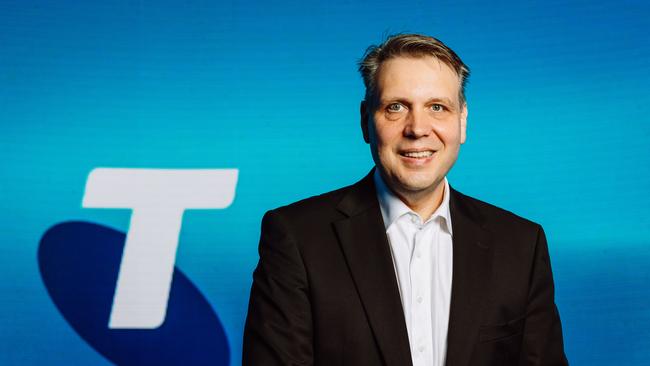New Venture Capital funds to implode as valuations crumble and raisings dry up: Telstra Ventures
Telstra Ventures says that, after spending money like ‘drunken sailors’, half the venture capital funds launched in the past five years will struggle to survive as markets hit a turning point.

A wrecking ball is set to tear through the venture capital industry, with half the number of firms that have launched in the past five years set to fold as raising capital becomes tougher and company valuations crumble.
That is the assessment of Telstra’s venture capital arm, which has more than $1.5bn under management and is forecasting more pain in the VC sector as some of the world’s biggest technology companies lay off hundreds of thousands of workers and capital raisings slow to a crawl.
It comes as Raphael Arndt, chief executive of the $190bn Future Fund, says global markets are at a turning point – citing war, a shift from globalisation, high government debt, an energy transition and stubborn inflation – requiring a dramatic shift in portfolio management.
Telstra Ventures managing director Matthew Koertge has drawn parallels between the dotcom crash of 2000 and the global financial crisis and says many of the funds that have launched since 2015 will not survive.
“A lot of people have come in, invested really aggressively … threw money around like drunken sailors and now it’s going to be very hard for those firms to raise more capital,” Mr Koertge said.
“Looking back at history, going back to even the dotcom crash, there were lots of investors who came in as the market was starting to peak and then a lot of these groups were not able to maintain and sustain their business.”
The first two years of the pandemic fuelled record spending in the sector. By the end of 2021, 160 companies a quarter were achieving unicorn, or $US1bn ($1.5bn), valuations versus 25-30 a quarter from 2016 to 2020. The amount of capital VC firms raised soared from less than $US150bn in 2015 to almost $US250bn in 2021 before diving to less than $US100m last year, according to Pitchbook.
“The number of deals that were done and the number of venture capital firms that have been created, it really skyrocketed,” Mr Koertge said. “Looking at the number of unicorns that were created is just staggering. Now unicorn birthrates have fallen very dramatically to less than 20 by the end of 2022,” he added.
“There have been a lot of new groups that have entered the market over the past five years and, obviously, there are only so many good deals out there.”
The past 12 months has been particularly painful in Silicon Valley with technology company lay-offs totalling more than 200,000 – 60,000 of which was in November alone with Meta, Amazon and Twitter accounting for the lion’s share of retrenchments.
The sector’s heavy losses drove Wall Street’s Nasdaq Composite Index down 33.10 per cent for the year, to 10,446.48 points – its second-worst result since the dotcom bust wiped 40.5 per cent from the index’s value. It was surpassed by the 39.23 per cent fall of 2008.
The IPO market dried up amid bear markets amid the sustained volatility that accompanied interest rate hikes by major central banks. Across the industry, equity capital markets are about 50 per cent lower than the past two years and about 25-30 per cent down on the longer-run average.
Mr Koertge’s colleague, Saad Siddiqui, said overall, start-ups would need to grow by 2.5 times in 2023 just to get to the same valuation as they did in 2021.
In a position paper released last month, the Future Fund said given the current market dynamics, ”institutional investors are likely to need to work harder and employ different combinations of strategies than they have in the past”. “The structural tailwinds driving market returns are fading and headwinds are challenging investors’ ability to achieve their return objectives, while levels of risk and volatility are higher,” it said.
“Large investors must now make more portfolio decisions that collectively ‘move the dial’. This may require investors to resource differently and to put in place more robust and nimble governance arrangements, systems, and processes. Refreshed portfolio planning and dynamic positioning are likely to supplant set and forget approaches.”
Mr Koertge anticipates that about half the VC firms launched since 2017 will fold in the next five years as they fail to raise new capital. He said those that survive will need to evolve “innovative models” to attract entrepreneurs who are demanding “more measurable value-add” from their investors.”
Overall, Mr Koertge remains optimistic – even in the wake of the mass lay-offs that have plagued the tech sector – saying it will create investment opportunities, again drawing parallels from the worst economic crises of the past 20 years. “With many of the big tech companies laying off staff, this will likely create many new start-up companies,” he said.
“After the dotcom crash and the global financial crisis, some of the best, most valuable companies were actually generated in the years following those corrections.
Amid the bear market, Telstra Ventures raised $500m in September to invest in tech start-ups aimed at tackling climate change and greenwashing. The first company that has caught its attention is OpenSolar, which has been providing its software platform free-of-charge to solar panel installers in more than 130 countries.
In the past 10 years, Telstra Ventures has invested in 90 companies and generated more than $US440m ($647m) in revenue.




To join the conversation, please log in. Don't have an account? Register
Join the conversation, you are commenting as Logout